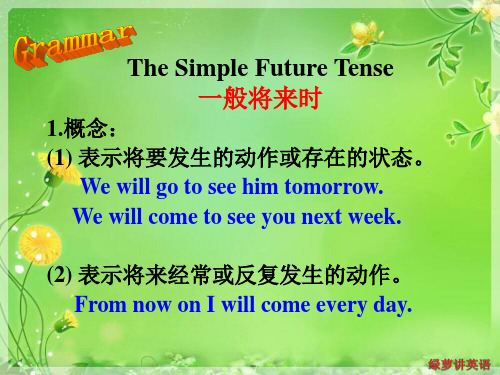(完整版)一般将来时课件(PPT)
合集下载
-一般将来时态完整ppt课件

jobs.
dull jobs.
Will he do dull Yes, he will.
jobs?
No, he won’t.
There will be a computer in it.
They will do heavy work.
There won’t be a computer in it.
They won’t do heavy work.
完整版ppt课件
12
1. Tomorrow, there will be a football match in our school. I’m going to watch it.
2. I’m going to revise lessons with Li Ming. 3. Everyone will have a computer in the future. 4. We will use the Internet to study at home. 5. My dream school will have big classrooms and libraries. 6. Students will talk to their teachers on the computers. 7. Will there be schools in the future?
No, there won’t.
完整版ppt课件
13
you
are
(be完)整n版poptt课b件etter in the evening. 11
汉译英:
1、明天,我们学校将有场足球赛,我准备去看. 2、我打算和李明一起复习功课. 3、将来每个人都有一台计算机. 4、我们将使用因特网在家里学习. 5、我理想的学校将有宽大的教室和图书室. 6、学生将在电脑上与老师对话. 7、将来有学校吗?不,没有
英语语法 一般将来时(共12张PPT)

上一页
第1页,共12页。
时态:一般将来时 The Simple Future Tense
3、 shall与will的区别:
shall常用于第一人称(we/ I ).
shall
否定式:shall not = shan’t
缩略形式 ’ll
will常用于第二、三人称,但在口 will 语中各种人称都可以用will.
is about to leave for Beijing. eg: He Will there be only one country?
注:after+时间段,往往指过去的一段时间。
next Saturday. We will start off in ten minutes.
I was about to start out when it
•
Yes, there will. / No, there won’t.
第9页,共12页。
What can you see in this picture?
There will be…将会有
There will be more people. There will be fewer trees. There will be more pollution. There will be more buildings. There will be more cars.
supper time.
上一页
主菜单 第5页,共12页。
下一页
● 一般将来时 ●
be about to do:表示“即将做某 事”或“将
要做某事” 如come, go, arrive, leave, start, return, meet, get等。
第1页,共12页。
时态:一般将来时 The Simple Future Tense
3、 shall与will的区别:
shall常用于第一人称(we/ I ).
shall
否定式:shall not = shan’t
缩略形式 ’ll
will常用于第二、三人称,但在口 will 语中各种人称都可以用will.
is about to leave for Beijing. eg: He Will there be only one country?
注:after+时间段,往往指过去的一段时间。
next Saturday. We will start off in ten minutes.
I was about to start out when it
•
Yes, there will. / No, there won’t.
第9页,共12页。
What can you see in this picture?
There will be…将会有
There will be more people. There will be fewer trees. There will be more pollution. There will be more buildings. There will be more cars.
supper time.
上一页
主菜单 第5页,共12页。
下一页
● 一般将来时 ●
be about to do:表示“即将做某 事”或“将
要做某事” 如come, go, arrive, leave, start, return, meet, get等。
一般将来时PPT课件

一般将来时的特殊用法和例句
Be going to结构
介绍be going to结构在一般将来时中的特殊用法。
表计划和打算
举例说明一般将来时推测的语境和例句。
一般将来时常见错误和建议
常见错误 建议
解释常见的一般将来时错误用法。
提供一些建议和技巧,帮助学习者正确运用一般 将来时。
标志词
列举一般将来时常用的标志词和词组。
一般将来时的肯定句
1
主语
介绍一般将来时肯定句的主语使用方法。
2
助动词
解释一般将来时肯定句中的助动词的用法。
3
动词
说明一般将来时肯定句中动词的形式和变化。
一般将来时的否定句和疑问句
否定句
描述一般将来时否定句的构成和特点。
疑问句
阐述一般将来时疑问句的组成和提问方式。
一般将来时PPT课件
本PPT介绍一般将来时的定义、用法、结构、标志词,以及肯定句、否定句、 疑问句的构成方法。同时包括特殊用法、常见错误和建议,最后总结要点。
一般将来时的定义和用法
定义
介绍一般将来时在英语中的含义和用法。
用法
解释一般将来时的常见应用场景和意义。
一般将来时的结构和标志词
句子结构
展示一般将来时的句子结构和基本构成要素。
总结和要点
1 总结
总结一般将来时的核心概念和用法要点。
2 注意事项
提醒学习者注意一般将来时使用中的常见错 误和问题。
一般将来时PPT课件

A. will go B. won’t go C. can go D. went
一、单项选择
(C) 1. There __________ a meeting tomorrow afternoon.
A. will be going to B. will going to be C. is going to
shall常用于第一人称. shall
否定式:shall not = shan’t
will常用于第二、三人称,但在 will 口语中各种人称都可以用will.
否定式:will not = won’t
四、现_在___进__行___时态 + 表示将来的时 间状语也可以表示将来。
五、There be 句型的一般将来时态 的结构:there +is_g_o_in_g_to_ + be + 名词或there + will+ be + 名词。
begoingto表示根据主观判断将来肯定发生的事情表示根据主观判断将来肯定发生的事情will表示客观上将来势必发生的事情
The Simple Future Tense
一、一般将来时表示将来某一 时刻的动作,状态以及打算。 该时态一般与表示将来意义 的时间状语连用。如:
tomorrow, this month, the day
next week.
A. will be; is
B. is; is C. will be; will be D.
is; will be
(D) 4. There ________ a dolphin show in the zoo
tomorrow evening.
A. was B. is going to have C. will have D. is going
一、单项选择
(C) 1. There __________ a meeting tomorrow afternoon.
A. will be going to B. will going to be C. is going to
shall常用于第一人称. shall
否定式:shall not = shan’t
will常用于第二、三人称,但在 will 口语中各种人称都可以用will.
否定式:will not = won’t
四、现_在___进__行___时态 + 表示将来的时 间状语也可以表示将来。
五、There be 句型的一般将来时态 的结构:there +is_g_o_in_g_to_ + be + 名词或there + will+ be + 名词。
begoingto表示根据主观判断将来肯定发生的事情表示根据主观判断将来肯定发生的事情will表示客观上将来势必发生的事情
The Simple Future Tense
一、一般将来时表示将来某一 时刻的动作,状态以及打算。 该时态一般与表示将来意义 的时间状语连用。如:
tomorrow, this month, the day
next week.
A. will be; is
B. is; is C. will be; will be D.
is; will be
(D) 4. There ________ a dolphin show in the zoo
tomorrow evening.
A. was B. is going to have C. will have D. is going
通用版英语六年级下册一般将来时 课件 (共43张PPT)

tomorrow系列
tomorrow明天 tomorrow morning 明天早上 tomorrow afternoon 明天下午 tomorrow evening明天晚上 the day after tomorrow后天
next 系列
next time下次 next week下周 next month下个月 next summer/winter holida明年暑假/寒假 next year明年
B. going
C. goes
D. went
Summary
1.掌握一般将来时的定义 2.掌握一般将来时的结构 3.掌握一般将来时的时间标志词 4.掌握be going to+动原 和will+动原的区别 5.掌握一般将来时的句型转换 6.掌握一般将来时 的特殊用法
特殊疑问句 :特殊疑问词 + 一般疑问句?
1 I am going to swim tomorrow. What are you going to do tomorrow?
2 I am going to swim with my brother tomorrow. Who are you going to swim with tomorrow?
即学即练
4.He will paint it pink. (一般疑问句) Will he paint it pink?
5. There will be a sports meeting next week.(否定句) There will not be a sports meeting next week.
in+将来的年份(在…….年)
in+时间段 表示“m now on 从现在开始 in the future 在未来 in future 不久 before long不久之后 Soon 很快 Tonight在今晚 one day 有一天 some day某天 this afternoon/evening今天下午/晚上
tomorrow明天 tomorrow morning 明天早上 tomorrow afternoon 明天下午 tomorrow evening明天晚上 the day after tomorrow后天
next 系列
next time下次 next week下周 next month下个月 next summer/winter holida明年暑假/寒假 next year明年
B. going
C. goes
D. went
Summary
1.掌握一般将来时的定义 2.掌握一般将来时的结构 3.掌握一般将来时的时间标志词 4.掌握be going to+动原 和will+动原的区别 5.掌握一般将来时的句型转换 6.掌握一般将来时 的特殊用法
特殊疑问句 :特殊疑问词 + 一般疑问句?
1 I am going to swim tomorrow. What are you going to do tomorrow?
2 I am going to swim with my brother tomorrow. Who are you going to swim with tomorrow?
即学即练
4.He will paint it pink. (一般疑问句) Will he paint it pink?
5. There will be a sports meeting next week.(否定句) There will not be a sports meeting next week.
in+将来的年份(在…….年)
in+时间段 表示“m now on 从现在开始 in the future 在未来 in future 不久 before long不久之后 Soon 很快 Tonight在今晚 one day 有一天 some day某天 this afternoon/evening今天下午/晚上
初中英语一般将来时will和be going to讲解课件

句型:特殊疑问词+一般疑问句 -How are they going to school tomorrow? -By bike. -What is he going to do next Sunday? -He is going to read books. -When are you going to buy a new bike? -Tomorrow.
going to, 而多用will。 如:
If any beasts comes at you, I'll stay with you and help you.
1.Bob and I _w__il_l_m__a_tc_h__(watch) an action movie tomorrow.
2.We __w__il_l _b_e____(be) able to go to space in the future.
时间状语:
tomorrow 明天
next week 下周
next month 下个月 next year 明天
before不久
soon 不久
the day after tomorrow 后天
the year after next 后年
the week after next 下下周
基本句型: 肯定句: 主语 + will +v. 原形 否定句: 主语 + will +not + v.原形 一般疑问句: will +主语 + v.原形
3.The childrenw_i_ll_d_i_s_cu__ss__(discuss) the plan after school.
He is seriously ill. He is going to die. He will be twenty years old.
going to, 而多用will。 如:
If any beasts comes at you, I'll stay with you and help you.
1.Bob and I _w__il_l_m__a_tc_h__(watch) an action movie tomorrow.
2.We __w__il_l _b_e____(be) able to go to space in the future.
时间状语:
tomorrow 明天
next week 下周
next month 下个月 next year 明天
before不久
soon 不久
the day after tomorrow 后天
the year after next 后年
the week after next 下下周
基本句型: 肯定句: 主语 + will +v. 原形 否定句: 主语 + will +not + v.原形 一般疑问句: will +主语 + v.原形
3.The childrenw_i_ll_d_i_s_cu__ss__(discuss) the plan after school.
He is seriously ill. He is going to die. He will be twenty years old.
一般将来时课件PPT.上课用

注意事项
与“be going to + 动词原形”和“will + 动词原形”相比,“be about to + 动词原形”更强调即将发生的紧迫性。
04
一般将来时的否定形式
will not = won’t
01
"will not" 是 "will" 的否定形式 ,表示将来某个时间不会发生某 件事情。
明年这个时候我们将在巴黎度假。
表示未来的时间状语从句的连用
一旦你完成这个项目, 你就可以休息了。
即使明天下雨,我们 也会按时举行运动会。
只要他一回来,我们 就出发。
表示未来的时间状语从句的省略
明天见。 下周再见。
明天这个时候我们会在飞机上。
THANKS
主语 + will not + 动词原形 + 其他成分,例如:He will not come back until next month.(他下个月之前不会回来。)
Will + 主语 + 动词原形 + 其他成分,例如:Will you be available this afternoon?(你今天下午有空吗?)
表示预测和推测
总结词
一般将来时也可以用来表示对未来的预测和推测,通常基于 某种事实或证据。
详细描述
当我们根据已知事实或证据推断某件事情将在未来发生时, 可以使用一般将来时。例如,“根据天气预报,明天会下雨 ”表示对天气的预测,“根据市场趋势,明年房价可能会上 涨”表示对未来的推测。
表示意愿和打算
05
一般将来时的疑问形式
will + 主语 + 动词原形?
总结词
与“be going to + 动词原形”和“will + 动词原形”相比,“be about to + 动词原形”更强调即将发生的紧迫性。
04
一般将来时的否定形式
will not = won’t
01
"will not" 是 "will" 的否定形式 ,表示将来某个时间不会发生某 件事情。
明年这个时候我们将在巴黎度假。
表示未来的时间状语从句的连用
一旦你完成这个项目, 你就可以休息了。
即使明天下雨,我们 也会按时举行运动会。
只要他一回来,我们 就出发。
表示未来的时间状语从句的省略
明天见。 下周再见。
明天这个时候我们会在飞机上。
THANKS
主语 + will not + 动词原形 + 其他成分,例如:He will not come back until next month.(他下个月之前不会回来。)
Will + 主语 + 动词原形 + 其他成分,例如:Will you be available this afternoon?(你今天下午有空吗?)
表示预测和推测
总结词
一般将来时也可以用来表示对未来的预测和推测,通常基于 某种事实或证据。
详细描述
当我们根据已知事实或证据推断某件事情将在未来发生时, 可以使用一般将来时。例如,“根据天气预报,明天会下雨 ”表示对天气的预测,“根据市场趋势,明年房价可能会上 涨”表示对未来的推测。
表示意愿和打算
05
一般将来时的疑问形式
will + 主语 + 动词原形?
总结词
一般将来时课件(PPT)

What are you going to do? I am going to take a look. What are you going to do ? I am going to give her a book. What are you going to do? We are going to take a trip. What are you going to do ? We are going to bake a cake. 我打算给她……I am going to _____________________ (练习应用一般将来时的 be going to 句型)
practice basketball every day
practice singing
pilot exercise every day
study hard
singer
doctor
basketball player
Pairwork
They will have an English party next week.
四、(1)变一般疑问句和否定句:
Will they have an English party next week?
回答: (肯)Yes,主语+will. (否)No,主语+won’t.
Yes,they will./No,they won’t(=they’ll not).
They won’t have an English party next week.
am
going
to
are going to
will go shopping
翻译下列句子。(注意句子的时态) 1今天我打算八点写家庭作业。 I ________ _________ _________ do my homework at eight today. 2.这周六我们打算去野餐。 We _____________ have a picnic this Saturday.. 3. 我妈妈今天下午将要去购物。 My mother _____ _____ ____ this afternoon。
- 1、下载文档前请自行甄别文档内容的完整性,平台不提供额外的编辑、内容补充、找答案等附加服务。
- 2、"仅部分预览"的文档,不可在线预览部分如存在完整性等问题,可反馈申请退款(可完整预览的文档不适用该条件!)。
- 3、如文档侵犯您的权益,请联系客服反馈,我们会尽快为您处理(人工客服工作时间:9:00-18:30)。
tomorrow the day after tomorrow tomorrow morning tomorrow afternoon tomorrow evening at 7:00 tomorrow morning ……
2.与“next一家” 连用
next
time year week month term Monday at 7:00 next Sunday morning ……
2.He will find some meat in the fridge soon. (变一般疑问句) W __i_ll he _f_in_d _a_n_y_ meat in the fridge?
3.She will stay there in a week. (对划线部分提问) __H_o_w _s_o_on_ w_i_ll__ she _s_t_a_y_ there?
We will/shall go to Beingjing next week.
He will go to Beingjing next week
(2).变一般疑问句和否定句:
They will have an English party next week. Will they have an English party next week?
2. be going to+do可表示事先计划的意图,而 will 则表示说话人当时决定的意图;
We're going to drive you home after the meeting. Don't call a taxi. We'll drive you home.
I feel ill now, and I'll go to see the doctor. I'm going to see the doctor this evening.
school late. Tomorrow he _w_il_l _get (get) up very early, so he _w_o_n’t be (not be) late for school tomorrow.
1.Lucy will do her homework at home soon. (改否定句) Lucy _w_o_n’_t_d_o_ her homework at home soon.
good. 4.What time _w__ill_ you _g_e_t_ (get) to
school tomorrow morning? 5.Jim w__il_l d(odo) a lot next Sunday.
Hew_i_ll__go(go)
shopping and _w_i_ll__c_oo(ckook) supper.
6. He usually _g_e_t_s (get) up at 6 in the morning. Look! He i_s_g_e_t_t_in(gget) up now. But yesterday he _g_o_t_ (get) up very late, so he _w_e_n_t (go) to
表示位置转移的动词(如:go, come, leave, start, arrive等),可用现
在进行时表示将来时
I’ m going fishing tomorrow. They' re leaving for Beijing next week.
My pen friend is coming to China next month.
Yes,there is./No, there isn’t
否定句式:
There isn’t going to be a sports meeting at our
school next week.
2. There will be
如:There will be a sports meeting at our school next week. 一般疑问式: Will there be a sports meeting at our school next week? 回答:
will 表示客观的将来,必定会发生 be going to根据迹象推测,有可能发生
----Look at the clouds outside . ----It's going to rain .
You will be forty years old next year. Tomorrow will be Sunday again.
Yes,there will./No, there won’t.
否定句式:
There won’t (will not) be a sports meeting at our school next week.
用动词的适当时态填空
1.__W__illyou __re_m__em__b_er(remember) to
3.与“in+一段时间” 连用 “在…之后”
three days
in
a week two mo#43;一段时间”提问,要用
how soon(多久以后)。
People will live to be 100 years old in 20 years.
How soon will people live to be 100 years old?
一般将来时态
(The Simple Future tense)
所有时态 都是通过
动词 变化来体
现的
future past now He often watches TV at night.
一般现在时
复习所学时态
future past now He is watching TV now.
现在进行时
什么是一般过去时?
buy the oranges tomorrow?
2.Who _w_i_ll_i_n_ve_n_t (invent) a new
computer in 2050? 3.We _w_il_l _g_o (go) to the cinema next
Sunday. The film _w_il_l _b_e (be) very
Please look at the sentences
我今年12岁.
I _a_m_ 12 years old this year.(be) 我去年11岁. I _w__a_s 11 years old last year(be)
I _w_il_l _be 13 years old next year(be)
future past now 一般过去时态表示过去某一时间发生的 动作或存在的状态。
He watched TV last night.
一、什么是一般将来时?
future
past now 一般将来时态表示在将来某一时间将发 生的动作或存在的状态。
He will watch TV tomorrow evening.
①
②
③
① Who will have an English party next week ?
② What will they have next week ?
③ When will they have an English party?
2. be going to 表将来
will 和be going to 的区别
He is studying hard and is going to try for the exams. 他正努力学习,准备参加考试。(不能用will 替换)
—Can somebody help me? ——谁能帮我一下吗? —I will. ——我来。(不能用be going to替换)
3.现在进行时表将来
三、一般将来时的谓语构成:
1.助动词will/shall +do
(1).will和shall为助动词,will用于任 何人称,但shall只能用于第一人称主 语I和we。
I will/shall go to school tomorrow.
They will go to school tomorrow.
4.There will be some orange in the cup. (变一般疑问句)
_W__il_l thereb_e_ _a_n_y_ orange in the cup?
他现在在北京。 He __i_s_ in Beijing now.(be)
他昨天在上海。
He w__a_s in Shanghai yesterday. (be) Hew_i_ll_be in Shanghai tomorrow. (be)
二、一般将来时的时间状语
1.与“tomorrow一家” 连用:
回答:(肯)Yes,主语+will. (否)No,主语+won’t.
Yes,they will./No,they won’t.
They won’t(will not) have an English party next week.
注意:won’t=will not
(3).变特殊疑问句
They will have an English party next week.
4.be about to +do 立刻,马上做..
We are about to leave.
四、there be 句型的一般将来式
1. There is/are going to be
如:There is going to be a sports meeting at
our school next week. 一般疑问式: Is there going to be a sports meeting at our school next week? 回答:
2.与“next一家” 连用
next
time year week month term Monday at 7:00 next Sunday morning ……
2.He will find some meat in the fridge soon. (变一般疑问句) W __i_ll he _f_in_d _a_n_y_ meat in the fridge?
3.She will stay there in a week. (对划线部分提问) __H_o_w _s_o_on_ w_i_ll__ she _s_t_a_y_ there?
We will/shall go to Beingjing next week.
He will go to Beingjing next week
(2).变一般疑问句和否定句:
They will have an English party next week. Will they have an English party next week?
2. be going to+do可表示事先计划的意图,而 will 则表示说话人当时决定的意图;
We're going to drive you home after the meeting. Don't call a taxi. We'll drive you home.
I feel ill now, and I'll go to see the doctor. I'm going to see the doctor this evening.
school late. Tomorrow he _w_il_l _get (get) up very early, so he _w_o_n’t be (not be) late for school tomorrow.
1.Lucy will do her homework at home soon. (改否定句) Lucy _w_o_n’_t_d_o_ her homework at home soon.
good. 4.What time _w__ill_ you _g_e_t_ (get) to
school tomorrow morning? 5.Jim w__il_l d(odo) a lot next Sunday.
Hew_i_ll__go(go)
shopping and _w_i_ll__c_oo(ckook) supper.
6. He usually _g_e_t_s (get) up at 6 in the morning. Look! He i_s_g_e_t_t_in(gget) up now. But yesterday he _g_o_t_ (get) up very late, so he _w_e_n_t (go) to
表示位置转移的动词(如:go, come, leave, start, arrive等),可用现
在进行时表示将来时
I’ m going fishing tomorrow. They' re leaving for Beijing next week.
My pen friend is coming to China next month.
Yes,there is./No, there isn’t
否定句式:
There isn’t going to be a sports meeting at our
school next week.
2. There will be
如:There will be a sports meeting at our school next week. 一般疑问式: Will there be a sports meeting at our school next week? 回答:
will 表示客观的将来,必定会发生 be going to根据迹象推测,有可能发生
----Look at the clouds outside . ----It's going to rain .
You will be forty years old next year. Tomorrow will be Sunday again.
Yes,there will./No, there won’t.
否定句式:
There won’t (will not) be a sports meeting at our school next week.
用动词的适当时态填空
1.__W__illyou __re_m__em__b_er(remember) to
3.与“in+一段时间” 连用 “在…之后”
three days
in
a week two mo#43;一段时间”提问,要用
how soon(多久以后)。
People will live to be 100 years old in 20 years.
How soon will people live to be 100 years old?
一般将来时态
(The Simple Future tense)
所有时态 都是通过
动词 变化来体
现的
future past now He often watches TV at night.
一般现在时
复习所学时态
future past now He is watching TV now.
现在进行时
什么是一般过去时?
buy the oranges tomorrow?
2.Who _w_i_ll_i_n_ve_n_t (invent) a new
computer in 2050? 3.We _w_il_l _g_o (go) to the cinema next
Sunday. The film _w_il_l _b_e (be) very
Please look at the sentences
我今年12岁.
I _a_m_ 12 years old this year.(be) 我去年11岁. I _w__a_s 11 years old last year(be)
I _w_il_l _be 13 years old next year(be)
future past now 一般过去时态表示过去某一时间发生的 动作或存在的状态。
He watched TV last night.
一、什么是一般将来时?
future
past now 一般将来时态表示在将来某一时间将发 生的动作或存在的状态。
He will watch TV tomorrow evening.
①
②
③
① Who will have an English party next week ?
② What will they have next week ?
③ When will they have an English party?
2. be going to 表将来
will 和be going to 的区别
He is studying hard and is going to try for the exams. 他正努力学习,准备参加考试。(不能用will 替换)
—Can somebody help me? ——谁能帮我一下吗? —I will. ——我来。(不能用be going to替换)
3.现在进行时表将来
三、一般将来时的谓语构成:
1.助动词will/shall +do
(1).will和shall为助动词,will用于任 何人称,但shall只能用于第一人称主 语I和we。
I will/shall go to school tomorrow.
They will go to school tomorrow.
4.There will be some orange in the cup. (变一般疑问句)
_W__il_l thereb_e_ _a_n_y_ orange in the cup?
他现在在北京。 He __i_s_ in Beijing now.(be)
他昨天在上海。
He w__a_s in Shanghai yesterday. (be) Hew_i_ll_be in Shanghai tomorrow. (be)
二、一般将来时的时间状语
1.与“tomorrow一家” 连用:
回答:(肯)Yes,主语+will. (否)No,主语+won’t.
Yes,they will./No,they won’t.
They won’t(will not) have an English party next week.
注意:won’t=will not
(3).变特殊疑问句
They will have an English party next week.
4.be about to +do 立刻,马上做..
We are about to leave.
四、there be 句型的一般将来式
1. There is/are going to be
如:There is going to be a sports meeting at
our school next week. 一般疑问式: Is there going to be a sports meeting at our school next week? 回答:
